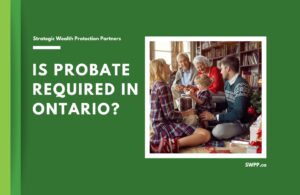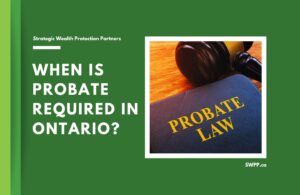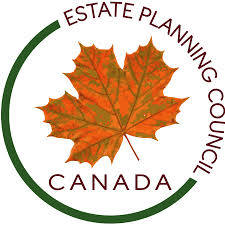Written by Ron Cooke, President & Founder of Strategic Wealth Protection Partners in Ontario, CEA®, Member of the Estate Planning Council Canada
How is the taxation of trusts in Canada? In Canada, most trusts are taxed as separate legal entities and must file their own T3 tax return each year.
Trust income that’s not paid out to beneficiaries is taxed at the highest marginal tax rate, making it important to distribute income when possible. If the trust distributes income to beneficiaries, that income is generally taxed in the beneficiaries’ hands instead.
There’s also the 21-year deemed disposition rule, which can trigger capital gains tax even if nothing is sold. Special trusts like alter ego trusts or graduated rate estates may have different tax treatments.
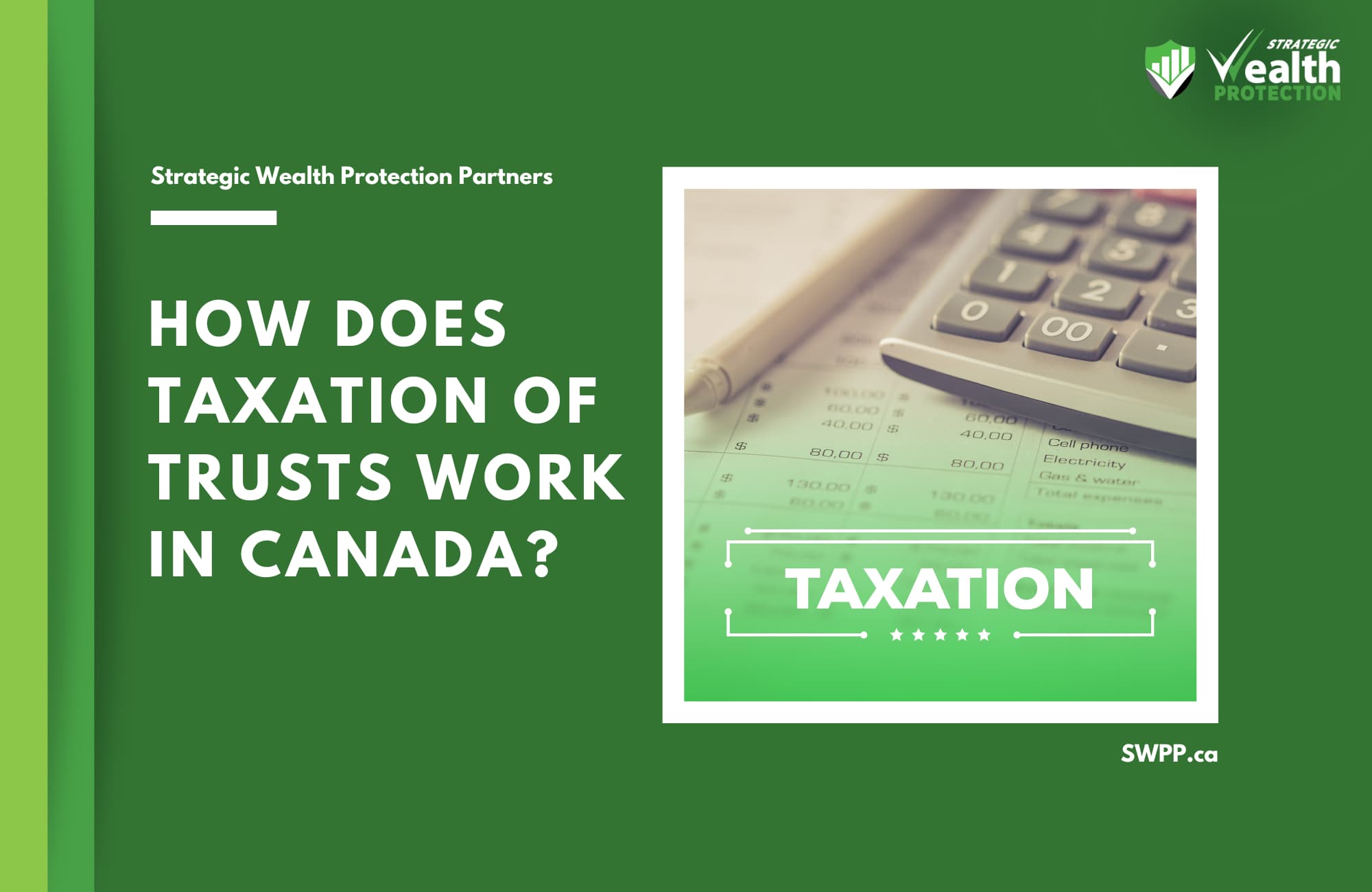
Key Takeaways
- Trusts are separate legal entities taxed under strict rules in the Income Tax Act
- Most trusts must now disclose beneficial ownership to CRA
- Income can be taxed in the trust or in the hands of beneficiaries
- The 21-year rule can trigger tax on unrealized capital gains
- Proper structuring is essential to reduce tax and avoid reporting issues
How Are Trusts Taxed in Canada?
To fully understand how trust taxation affects your situation, it’s best to speak with an estate planning expert, tax professional, or estate planning lawyer who specializes in Canadian trust law.
They can help you structure a trust properly and ensure you comply with current CRA rules and reporting requirements.
Key Tax Rules – Taxation of Trusts in Canada
| Trust Taxation Rule | What It Means |
|---|---|
| T3 Return Requirement | Most trusts must file a T3 Trust Income Tax and Information Return annually, even if no tax is owed. |
| Highest Marginal Tax Rate on Undistributed Income | Income kept in a trust is usually taxed at the top personal tax rate, unless it’s a special type of trust. |
| Attribution Rules | Income from assets gifted to a trust may be taxed back to the original contributor in certain situations. |
| 21-Year Deemed Disposition Rule | Most trusts are deemed to have sold and repurchased their capital assets every 21 years, triggering potential capital gains tax. |
| Income Allocation to Beneficiaries | Trusts can distribute income to beneficiaries, letting them pay tax at their own personal rates. |
| Graduated Rate Estate (GRE) Rules | An estate can use graduated tax rates for up to 36 months after death, after which it is taxed at the top rate like most other trusts. |
| Alter Ego and Joint Partner Trust Rules | These trusts are exempt from the 21-year rule during the lifetime(s) of the settlor and/or partner, and defer tax until death. |
| Capital Gains Exemption (LCGE) | Trusts holding qualified small business shares may access the Lifetime Capital Gains Exemption, if conditions are met. |
| New Trust Reporting Rules (2023 Onward) | Most express trusts, including bare trusts, must now provide detailed beneficial ownership information, even if no tax is owing. |
How Do Trusts Work in Canada?
Trusts are legal arrangements where one person (the settlor) transfers assets to another (the trustee) to manage for the benefit of others (the beneficiaries).
The trustee controls the trust property and makes decisions based on the terms outlined in the trust deed. The trust itself is a separate legal and taxable entity. Income and capital may be held in the trust or distributed to the beneficiaries depending on the trust’s terms.
Trusts are commonly used for wealth preservation, tax planning, and probate fees reduction.
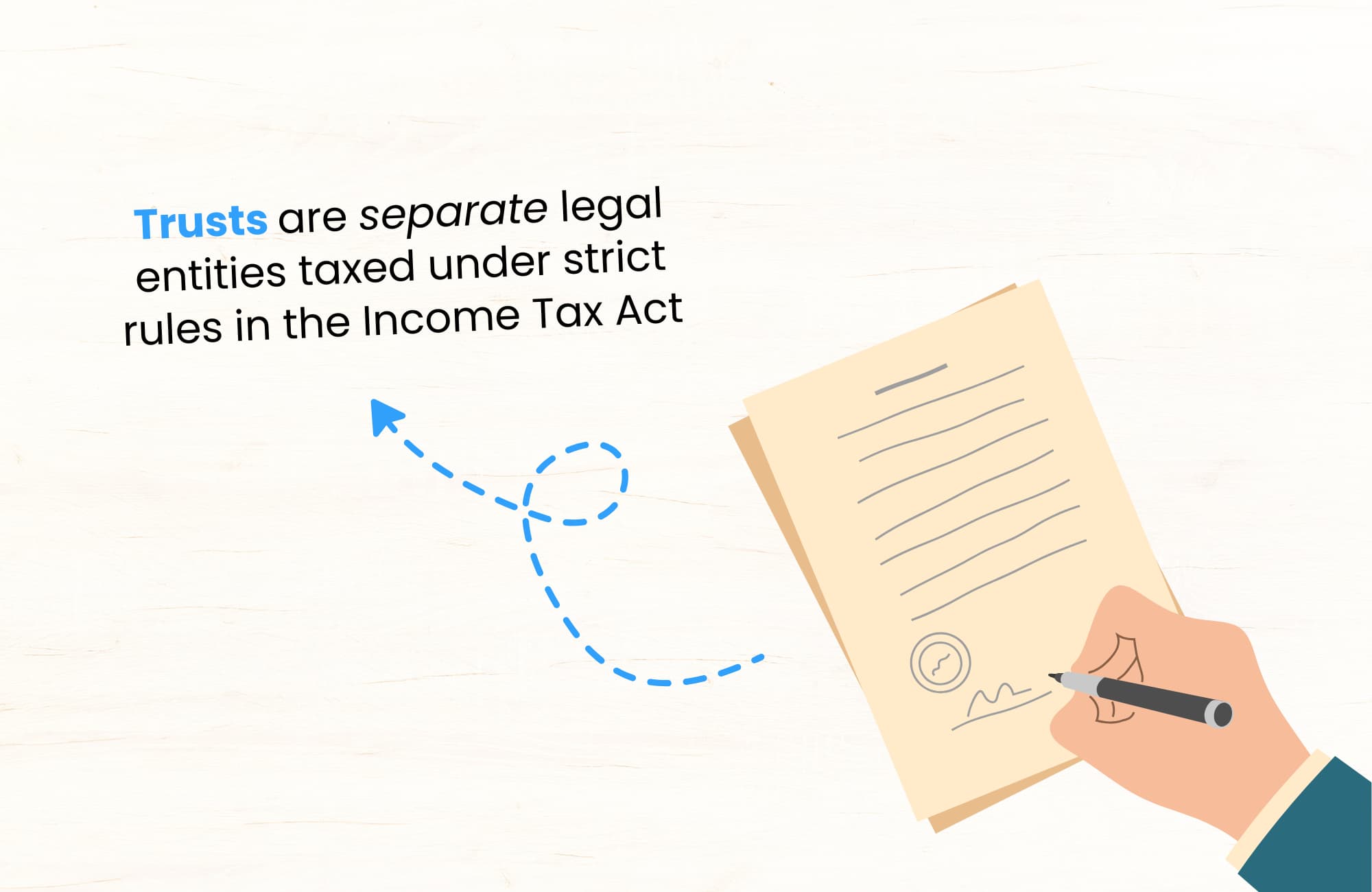
What Do I Need to Know about Capital Gains and Trusts?
Capital gains earned inside a trust are generally taxed at the trust level unless distributed.
Trusts can allocate gains to beneficiaries, allowing them to report the gains in their beneficiaries tax return, which may result in lower tax rates.
This can be particularly effective when beneficiaries have unused capital gains exemptions or low taxable income. If not distributed, the trust may face tax at the highest marginal rate. Planning distributions before year-end is key to managing the tax consequences.
How Can Attribution Rules Affect Taxation of a Trust?
Attribution rules under the Income Tax Act may apply when assets are transferred to a trust by an individual who retains an interest or control.
If the settlor gifts assets but maintains indirect control or benefits, the income may be attributed back to them. This eliminates the intended tax purposes of splitting income among family members. These rules most often affect revocable trusts and those with minor beneficiaries.
Proper structuring is essential to avoid triggering attribution.

What Is the 21-Year Deemed Disposition Rule?
Every 21 years, most Canadian trusts are deemed to sell and repurchase their capital assets at fair market value.
This results in a tax liability on unrealized capital gains—even if no actual sale occurred. For example, if a trust owns a cottage or a portfolio of investments that have appreciated, the CRA will tax the gain as if they were sold. This can lead to a large tax bill if not planned for in advance.
Some exceptions apply, such as alter ego trusts and graduated rate estates.
Graduated Rate Estates (GREs) in Canada
A graduated rate estate is a special designation for a deceased individual’s estate during the first 36 months after death.
During this period, the estate is taxed at graduated personal rates instead of the top rate. This allows for strategic timing of income and capital gains distributions. After 36 months, the estate becomes a regular trust and loses these tax benefits. GREs must be designated as such in the first T3 return filed.

Qualified Disability Trusts (QDTs) in Canada
A qualified disability trust allows families to set aside assets for a beneficiary eligible for the Disability Tax Credit.
These trusts are the only trusts allowed to use graduated tax rates beyond the first 36 months. The trust must be created by a will, and only one trust per disabled beneficiary can be designated as a QDT.
QDTs are useful for long-term care planning and preserving income-tested benefits. They remain subject to regular trust reporting obligations.
CRA Reporting and Filing Requirements
- T3 Trust Return: Must be filed annually by most trusts, even with no income.
- T3 Slips: Issued to beneficiaries who receive trust income, for inclusion in their beneficiaries tax return.
- Beneficial Ownership Disclosure: As of 2023, most express and bare trusts must file detailed reports identifying all parties with an interest in the trust.
- Maintain Financial Statements: Trustees must keep proper books and records for audit and compliance purposes.
- Filing Deadline: T3 returns are due 90 days after the trust’s year-end.
Using Trusts in Tax Planning
Trusts can be powerful tools for tax efficiency and long-term wealth protection.
Inter vivos trusts, alter ego trusts, and joint partner trusts are all used to manage tax liability and avoid probate fees. For business owners, a trust may hold shares and access the Lifetime Capital Gains Exemption if structured correctly.
Trusts also allow families to defer taxes by controlling when and how income is distributed. Every trust must be designed with both family needs and tax laws in mind.
Final Tax Tips for Managing a Trust
Trusts must be carefully administered to stay compliant and achieve their intended tax and estate planning goals.
Always document distributions and keep accurate financial statements. Don’t overlook attribution rules or the impact of the 21-year rule on long-term planning. Trustees must file on time and report all required beneficial ownership information.
Regular reviews with your accountant and estate planning lawyer help prevent surprises.

Common Questions
How much tax does a trust pay in Canada?
Most trusts pay tax at the highest personal tax rate unless income is distributed to beneficiaries.
Are trusts taxed at a higher rate than individuals?
Yes, unless it’s a special trust like a GRE or QDT, trusts pay tax at the top marginal rate.
Can a trust reduce my personal income tax?
Yes, when income is distributed to lower-income family members, the overall tax burden can be reduced.
Do beneficiaries pay tax on trust income?
Yes, beneficiaries include distributed income on their personal tax returns and pay tax at their own rates.
How do I report trust income on my personal tax return?
You’ll receive a T3 slip showing the amount to report in your beneficiaries tax return.
Is a family trust still worth it in Canada after recent tax changes?
Yes, but careful planning is more important than ever to meet new compliance and tax requirements.
What is an estate freeze?
An estate freeze locks in the current value of your interest in a company and passes future growth to your family or trust.
What are bare trusts?
A bare trust is a simple arrangement where the trustee holds property for the beneficiary without discretion—often used for real estate.
Discover the Benefits of a Living Trust in Ontario
Are you an Ontario resident considering a living trust as part of your estate planning?
At Strategic Wealth Protection Partners, we’re here to guide you through every step of the process with expert advice and personalized support. Begin your estate planning journey today with a Living Estate Plan Consultation from our experienced team.
Our mission at SWPP is to help you create an estate plan that secures your legacy, shields your assets from unnecessary taxation, and ensures your loved ones are cared for. By designing a living trust tailored to your goals, our experts will help you build a plan that truly reflects your values and priorities.
Take control of your future—start planning today!
Schedule a Living Estate Plan Consultation
Planning your legacy is about more than numbers—it’s about ensuring your family remembers you and your values are honoured for many years to come.
Estate planning and trusts can feel overwhelming, especially if it’s your first time. That’s why we’re here.
With our simple, 5-Step Living Estate Plan, we make the process easy, helping you create a comprehensive estate plan or trust that protects your assets from taxes and probate fees while preserving your legacy. Tools like The Final Word Journal capture your story, wishes, and essential details like accounts and end-of-life plans, ensuring your family has clarity and comfort.
Take the first step today—schedule a consultation call and give your family the ultimate gift: peace of mind and the assurance they were always your priority.
Read More
If you’re starting your estate planning process, you may find these articles helpful:
- What Is the Tax Rate on a RRIF at Death?
- What Is a Living Trust in Canada? And How Does It Work?
- How to Set Up a Living Trust in Canada: Step-by-Step Guide
About the Author
RON COOKE, PRESIDENT & FOUNDER OF STRATEGIC WEALTH PROTECTION PARTNERS

With over 30 years in financial services, I’ve seen the challenges families face when a loved one passes—lost assets, unnecessary taxes, and emotional stress. That’s why I created the Living Estate Plan, a comprehensive process to protect assets, eliminate estate and probate fees, and create legacies that are remembered for many years to come.
This plan ensures your family receives not just your wealth, but a meaningful reminder of your care and love. Tools like The Final Word Journal capture your story, wishes, and essential details, offering clarity and comfort during difficult times.
Your final gift should be more than money—it should be peace of mind, cherished memories, and an organized estate.
Schedule a Call
Schedule a 30-minute consultation call with Strategic Wealth Protection Partners.
Click HERE to schedule a consultation.


